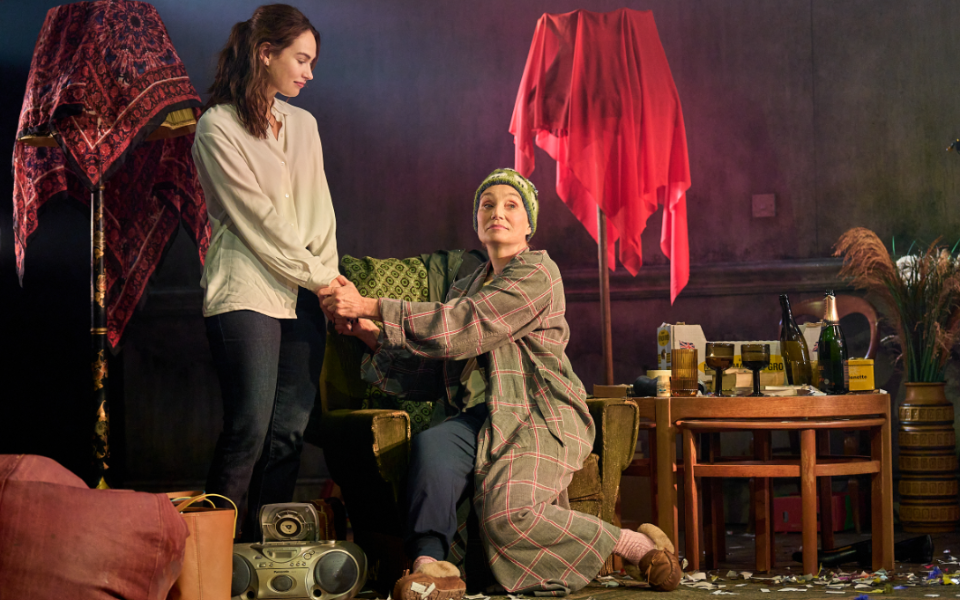
This play is probably too high school. What do I mean? It is the perfect play to analyse in the classroom: please set out the similarities and differences between Kate’s and Elaine’s narrative; please explain how the play reflects and differs from the #meetoo sentiment of the 2020ies, provide your interpretation of the play’s title in the context of the heroism of its protagonists…. and so on. It is drawn with lines too thick; it lacks subtlety, it is just that bit too obvious – you know how it will end before it has quite began.
But with Kristin Scott Thomas at the helm, these shortcomings become less visible. And frankly, Lily James is not bad at all. After Emilia Clarke in Seagull, I was bracing myself; after Lily Allen in The Pilowman I was very sceptical. But actually, Lily James came through. She might have one guise throughout – but for me it works – it is what she has effectively been reduced to – the one dimension left to a female Oxford graduate whose confidence and feeling of self-worth has been destroyed by the world at large and by her very own husband. And she plays it well – the self-deprecation, the little laughs, the hands strewn together like a little embarrassed girl. She is the same throughout, but that makes perfect sense to me.
And can I just clarify one more thing – for me, this is not a ‘me-too’ play. I actually believe that its intention is to make the audience stop and think about placing too many problems under the me-too umbrella. This is a play about the abuse women suffer within relationships regardless of their class and affluence. It would be easy to dismiss the challenges that Kate faces because of her so called ‘privilege.’ Whether poor or rich, whether Oxford educated or not, abuse is abuse; coercive behaviour is coercive behaviour. Class, background, education – all these things matter, but being from an upper class, having a more privileged background, being educated at a top institution – none of these will protect a woman from an abusive man. And if for one moment we dismiss a woman’s claims because of her so called ‘privilege’ then we fail all women.
Similarly, we fail women if we dismiss them for being overly dramatic –crazy, unstable, emotional when they should be rational. So, he killed some birds – and because of that you go away into hiding and give up your career, that feels somewhat OTT, does it not? So he wants you to have another child, even though you have told him many times you do not want that for yourself – surely you can just stand your ground, you are exaggerating your plight. But going to see this play at the exact same time as the story of Gracie Spinks is playing out in the media weighs heavily on my mind.
This play illustrates one more very important issue – women need women’s only spaces – spaces where they will not be judged for being sensitive, accused of being unhinged and overly dramatic. For me this play is about what happens when you allow a man into a women’s only space, when you deny women the emotional support they are entitled to, when you take away their places to heal and find strength in other women.
It is also a play about how much women are forced to give up – and I do not mean just careers to have babies. This about the little allowances we have to make every day because of how men are – don’t wear those clothes, don’t walk down that dark path, don’t get into that kind of cab and so on and so on.
So overall, even if this is not the best play, it is a story well worth telling and told very well by the two leading actresses. But I would have changed one thing – rather than go on maternity, in my view Kate should have died giving birth to her second child. I think that would have clarified a lot.